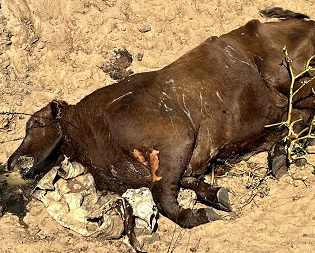
New business hubs for fresh produce

The newly constructed Fresh Produce Business Hub in Rundu (Photograph by Mathias Haufiku).
Cabinet in 2004 approved a programme of investment and promotion for increased food production through irrigation, which led to the establishment of the Green Scheme Programme implemented in 2008. Several of these projects are based along the perennial rivers. As the Green Scheme projects increased their output, the need for storage and processing facilities was identified.
Unlike meat, fish and cereal industries, the country’s horticultural industry value chain has been characterized by the missing linkage of a bulk cold storage, ripening, marketing, processing and logistical facility. The new efficient fresh produce hubs support all producers, processors, traders as well as consumer needs. Furthermore, a conflict exists between production, processing and preservation in the country.
The lack of such facilities is ascribed to the huge capital investment costs and the associated risks in a country where horticultural production is exposed to the vagaries of an erratic climate.
The hubs will act as regional centers for the bulk trading of fresh produce for the domestic as well as export trade and will provide business opportunities for processing, marketing and value adding through industrial activities such as sorting, cleaning, grading, packaging, branding, drying, bottling and canning. The hubs also anchor marketing services.
President Hifikepunye Pohamba, who officially inaugurated the two hubs, said the facilities will serve as catalysts to further stimulate increased agricultural production. “This will also contribute to the realization of the Fourth National Development Plan’s target for the agricultural sector to contribute 4% to the Gross Domestic Product,” he said.
Pohamba urged all stakeholders to continue supporting the development of the agricultural sector, especially the horticulture sub-sector to enable farmers to provide the nation with fresh produce.
Speaking at the inauguration of the Fresh Produce Business Hub in Ongwediva, the President stated that there was no reason as to why the country had to continue importing basic commodities such as vegetables and fruit, which it is capable of producing through the Green Scheme projects such as Etunda and other aqua culture projects in Omusati, Oshikoto, Ohangwena and Kunene Regions.
“We have the land and water and we have people to cultivate the land, therefore our people must get to work and produce adequate food locally to feed the nation,” Pohamba emphasised.
The hub properties will be managed by the Agricultural and Marketing Trade Agency (AMTA), an agency that is responsible for marketing, processing and value addition of the country’s agricultural produce as well as the management and maintenance of the government’s agricultural marketing and processing facilities and infrastructure. All local products produced from the Green Scheme projects will bear the AMTA logo.
The two hubs are estimated to have cost a total of N$217 million and will also accommodate the storage of fish and meat products. Construction for a similar hub in Windhoek will soon commence.











































